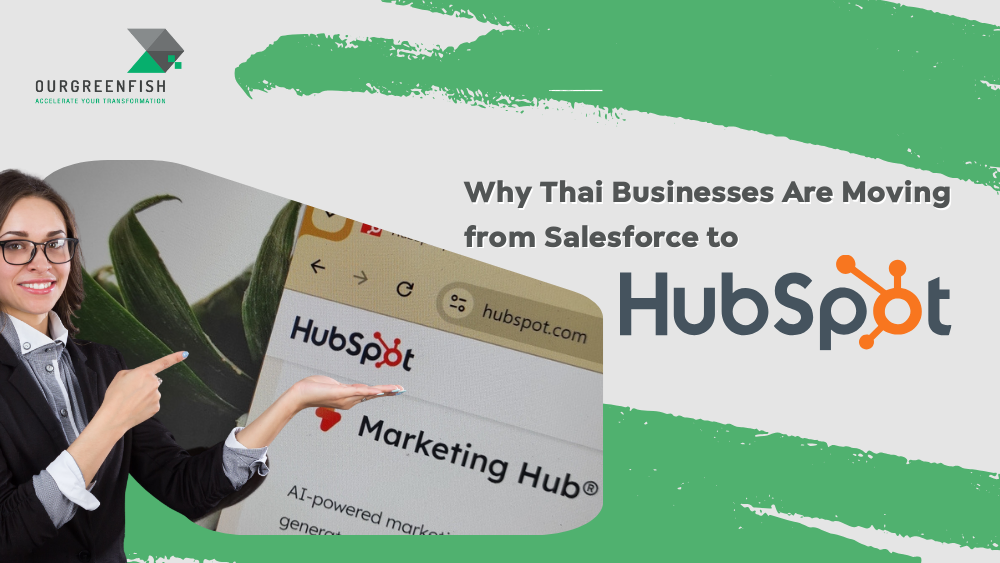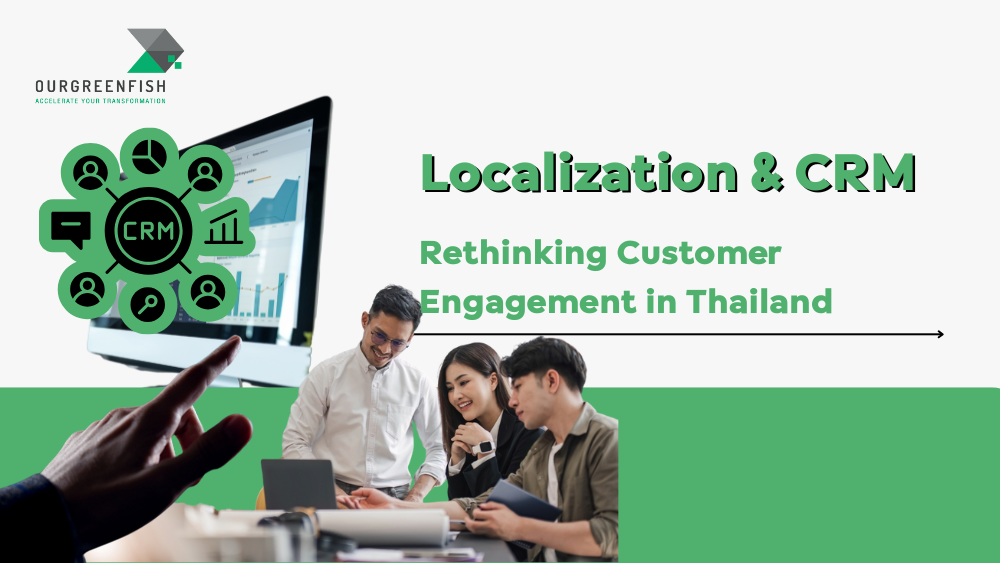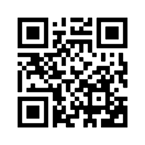Thailand’s fast-growing digital economy has led to a surge in demand for CRM platforms that balance power with usability. While Salesforce has long been considered the global standard for enterprise CRM, many Thai businesses particularly SMBs and mid-sized enterprises are shifting toward HubSpot as a more agile, cost-effective, and user-friendly alternative.
Salesforce vs. HubSpot in Thailand : Why Businesses Are Switching
Salesforce was initially adopted by many large Thai enterprises seeking enterprise-level customization. However, as digital adoption deepens across Thai SMEs, the challenges of high implementation costs, complex interfaces, and heavy reliance on third-party consultants have become increasingly apparent.
In contrast, HubSpot offers:
- Simpler onboarding with an intuitive user interface in Thai and English
- Lower total cost of ownership (TCO) with built-in marketing, sales, and service tools
- Faster time to value, especially for teams without dedicated IT support
Thai businesses are choosing HubSpot not because it’s simpler, but because it better matches their current business realities—where agility and clarity matter more than endless customization.
HubSpot’s User-Friendly CRM : Fueling Growth in Thailand
One key reason for HubSpot’s growing popularity in Thailand is its approachable design. Teams without deep CRM expertise can:
- Set up pipelines and workflows in under a day
- Use AI-powered recommendations for marketing and sales follow-up
- Access dashboards and reports without relying on external developers
This self-serve CRM experience empowers Thai businesses to scale faster. In a market where tech talent is still scarce, HubSpot’s “no-code” customization capabilities offer huge advantages over Salesforce’s more developer-intensive architecture.
Thai firms that switched to HubSpot report a 32% faster implementation cycle compared to Salesforce .
The Rise of SMBs and Mid-Market Enterprises Choosing HubSpot
Thailand’s startup and SME ecosystem has grown exponentially in recent years. With over 3 million SMEs contributing 34.2% of the country’s GDP, these businesses are seeking CRM platforms that don’t require enterprise-scale budgets.
HubSpot’s modular pricing and freemium entry point make it ideal for:
- E-commerce entrepreneurs scaling DTC brands
- B2B service providers looking for lead generation automation
- Health and wellness businesses building LINE-integrated campaigns
These companies appreciate HubSpot’s balance of functionality and affordability, with native integration to tools like LINE OA, Google Ads, and Facebook Messenger—key channels in Thailand’s marketing landscape.
HubSpot’s Impact on Retention and Lead Nurturing
Retention is a critical metric for Thai businesses, especially in competitive verticals like skincare, education, and SaaS. HubSpot provides a CRM structure that prioritizes lifecycle marketing:
- Lead scoring based on behavior, not just form-fills
- Smart content that personalizes messaging across email, web, and LINE
- Workflow automation that re-engages leads based on inactivity or browsing behavior
One mid-sized Thai edtech firm reported a 40% increase in course re-enrollment after implementing HubSpot’s nurturing flows for dormant leads.
By contrast, businesses using Salesforce often struggle with overly complex lead segmentation logic that requires developer time to adjust.
Case Studies : Thai Companies That Switched
- B2B Logistics Platform
After years on Salesforce, this logistics startup moved to HubSpot due to increasing costs and difficulty in customizing dashboards. Within 90 days, it built a full-funnel pipeline, shortened sales cycles by 23%, and cut CRM maintenance costs by half.
- Southeast Asian E-commerce Brand
Operating across Thailand and Vietnam, this DTC brand replaced Salesforce with HubSpot to streamline marketing and CRM across regions. HubSpot’s Thai-language landing pages and LINE integrations boosted local conversions by 48%.
- Fintech Startup in Bangkok
With Salesforce, the team struggled to segment and score leads dynamically. HubSpot’s AI-assisted lead scoring and user-friendly reporting helped the sales team prioritize better, resulting in a 29% lift in MQL-to-SQL conversion.
While Salesforce remains a powerhouse CRM globally, HubSpot is emerging as the go-to solution for Thai businesses that value usability, speed, and integration over extensive customization.
For foreign brands entering Thailand—or local businesses scaling fast—HubSpot offers a CRM platform that adapts to the way Thai teams work, communicate, and sell.
As Thailand’s digital economy matures, the CRM battle isn’t about more features. It’s about better fit. And for many Thai businesses, HubSpot is proving to be the better match.
References
-
Thailand’s MarTech Report. (2025). Final MarTech Report 2025. Retrieved from [contentshifu.com]
-
HubSpot. (2024). CRM Usage Trends in Southeast Asia. Retrieved from [hubspot.com]
-
Thai Ministry of Commerce. (2024). SME Development Statistics. Retrieved from [moc.go.th]
Read more articles :
Latest update: HUBSPOT MARKETING+ (อัปเดตล่าสุด : HUBSPOT MARKETING+)
Contact us
Tel : +66 2-0268918
E-mail : contact@ourgreen.co.th
Website : ourgreenfish.com

.webp?width=158&height=85&name=New-logo-Ourgreen%20(1).webp)













.png?width=300&name=Enrichment%20Data%20(1).png)
.png?width=300&name=Knowledge-Based%20Content%20%20(1).png)





No Comments